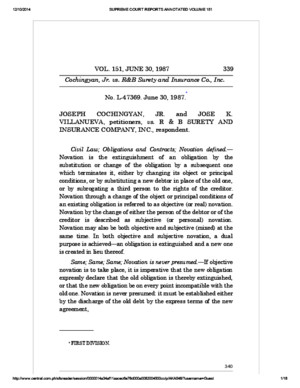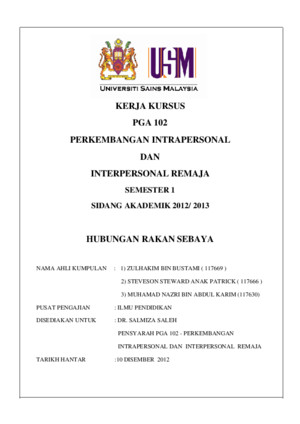Cochingyan v RB Surety
There is document - Cochingyan v RB Surety available here for reading and downloading. Use the download button below or simple online reader.
The file extension - PDF and ranks to the Documents category.
Tags
Related
Comments
Log in to leave a message!
Description
Download Cochingyan v RB Surety
Transcripts
12/10/2014 SUPREME COURT REPORTS ANNOTATED VOLUME 151http://wwwcentralcomph/sfsreader/session/0000014a34af11aacec6e78d000a0082004500cc/p/AKA548/?username=Guest 1/18 VOL 151, JUNE 30, 1987339 Cochingyan, Jr vs RB Surety and Insurance Co, Inc No L-47369 June 30, 1987 * JOSEPH COCHINGYAN, JR and JOSE K VILLANUEVA, petitioners, vs R B SURETY ANDINSURANCE COMPANY, INC, respondent Civil Law; Obligations and Contracts; Novation defined— Novation is the extinguishment of an obligation by thesubstitution or change of the obligation by a subsequent onewhich terminates it, either by changing its object or principalconditions, or by substituting a new debtor in place of the old one,or by subrogating a third person to the rights of the creditorNovation through a change of the object or principal conditions of an existing obligation is referred to as objective (or real) novationNovation by the change of either the person of the debtor or of thecreditor is described as subjective (or personal) novationNovation may also be both objective and subjective (mixed) at thesame time In both objective and subjective novation, a dualpurpose is achieved—an obligation is extinguished and a new oneis created in lieu thereof Same; Same; Same; Novation is never presumed— If objectivenovation is to take place, it is imperative that the new obligationexpressly declare that the old obligation is thereby extinguished,or that the new obligation be on every point incompatible with theold one Novation is never presumed: it must be established eitherby the discharge of the old debt by the express terms of the newagreement, _______________ * FIRST DIVISION 340 12/10/2014 SUPREME COURT REPORTS ANNOTATED VOLUME 151http://wwwcentralcomph/sfsreader/session/0000014a34af11aacec6e78d000a0082004500cc/p/AKA548/?username=Guest 2/18 340SUPREME COURT REPORTS ANNOTATED Cochingyan, Jr vs RB Surety and lnsurance Co, Inc or by the acts of the parties whose intention to dissolve the oldobligation as a consideration of the emergence of the new onemust be clearly discernible Same; Same; Same; If old debtor is not released, no novationoccurs and the third person who assumed the obligation becomes a co debtor or surety or a co-surety— Again, if subjective novation bya change in the person of the debtor is to occur, it is not enoughthat the juridical relation between the parties to the srcinalcontract is extended to a third person It is essential that the olddebtor be released from the obligation, and the third person ornew debtor take his place in the new relation If the old debtor isnot released, no novation occurs and the third person who hasassumed the obligation of the debtor becomes merely a co-debtoror surety or a co-surety Same; Same; Same; Novation is not implied when the partiesto the new obligation expressly negated the lapsing of the oldobligation— Neither can the petitioners anchor their defense onimplied novation Absent an unequivocal declaration of extinguishment of a pre-existing obligation, a showing of completeincompatibility between the old and the new obligation (andnothing else) would sustain a finding of novation by implicationBut where, as in this case, the parties to the new obligationexpressly recognize the continuing existence and validity of theold one, where, in other words, the parties expressly negated thelapsing of the old obligation, there can be no novation The issueof implied novation is not reached at all Same; Same; Same; Article 2079 of the Civil Code, notapplicable; Case at bar— The Indemnity Agreement speaks of theseveral indemnitors “apply[ing] jointly and severally (in solidum) to the [R B Surety]—to become SURETY upon a SURETY BOND demanded by and in favor of [PNB] in the sum of [P400,00000] for the faithful compliance of the terms andconditions set forth in said SURETY BOND—” This part of the Agreement suggests that the indemnitors (including thepetitioners) would become co-sureties on the Security Bond infavor of PNB The record, however, is bereft of any indication thatthe petitioners-indemnitors ever in fact became cosureties of R B Surety vis-a-vis the PNB The petitioners, so far as the recordgoes, remained simply indemnitors bound to R B Surety but not 12/10/2014 SUPREME COURT REPORTS ANNOTATED VOLUME 151http://wwwcentralcomph/sfsreader/session/0000014a34af11aacec6e78d000a0082004500cc/p/AKA548/?username=Guest 3/18 to PNB, such that PNB could not have directly demandedpayment of the Principal Obligation from the petitioners Thus,we do not see how Article 2079 of the Civil Code—which providesin part that “[a]n extension granted to the debtor by the creditorwithout the consent of the guarantor extinguishes theguaranty”—could apply in 341 VOL 151, JUNE 30 1987341 Cochingyan, Jr vs RB Surety and Insurance Co, Inc the instant case The petitioner-indemnitors are, as it were,secondtier parties so far as the PNB was concerned and anyextension of time granted by PNB to any of the first-tier obligors(PAGRICO, R B Surety and the trustor[s]) could not prejudicethe second-tier parties Same; Same; Same; Same; Theory behind Art 2079 is that anextension of time given to the principal debtor by the creditorwithout the surety’s consent would deprive the latter of his right to pay the creditor and to be immediately subrogated to the creditor’sremedies against the principal debtor upon srcinal maturity— The theory behind Article 2079 is that an extension of time givento the principal debtor by the creditor without the surety’sconsent would deprive the surety of his right to pay the creditorand to be immediately subrogated to the creditor’s remediesagainst the principal debtor upon the srcinal maturity date Thesurety is said to be entitled to protect himself against thecontingency of the principal debtor or the indemnitors becominginsolvent during the extended period The underlying rationale isnot present in the instant case Same; Same; Same; Indemnity clauses held enforceable andnot against any public policy— The last issue can be disposed of quickly, Clauses (b) and (c) of the Indemnity Agreements (quotedabove) allow R B Surety to recover from petitioners even beforeR B Surety shall have paid the PNB We have previously heldsimilar indemnity clauses to be enforceable and not violative of any public policy The petitioners lose sight of the fact that theIndemnity Agreements are contracts of indemnification not onlyagainst actual loss but against liability as well While in acontract of indemnity against loss an indemnitor will not be liableuntil the person to be indemnified makes payment or sustains
Recommended















